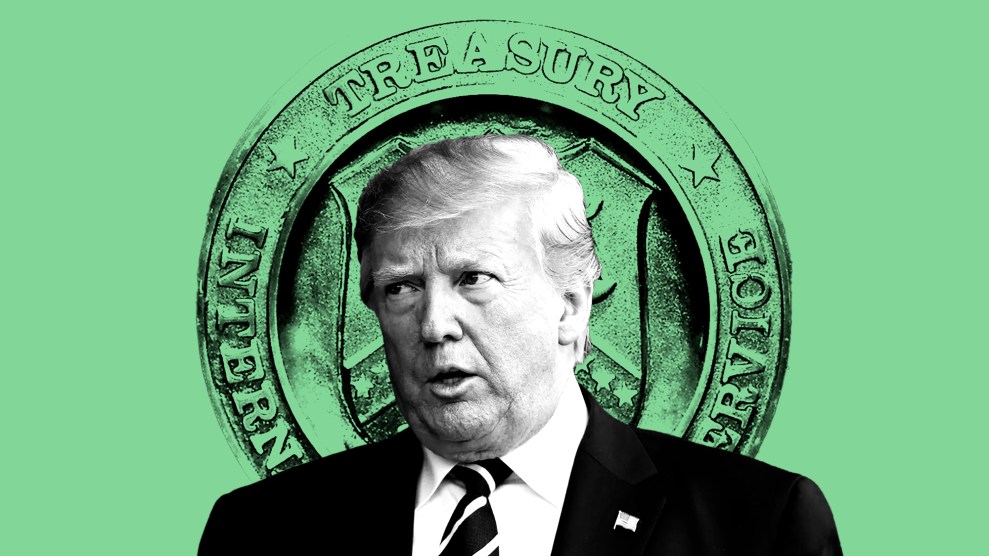
Mother Jones illustration; George Marks/Retrofile RF/Getty
The Supreme Court will hear oral arguments on Tuesday in Moore v U.S., a case that nominally involves the right of the US government to tax a couple, Charles and Kathleen Moore, on foreign corporate profits they have yet to receive.
Sounds arcane, but the case, bankrolled by the Competitive Enterprise Institute, could potentially neuter Congress’ ability to tax the swollen assets of America’s shareholder class. Indeed, a decision in favor of the petitioners could potentially wreak havoc on a century of tax law, upending provisions Congress enacted to curb tax abuses by some of America’s wealthiest citizens.
To get to the crux of the matter, I reached out to Steven Rosenthal, a senior fellow with the Urban-Brookings Tax Policy Center and a former staff attorney for Congress’ Joint Committee on Taxation, who has intricate knowledge of tax law and has written quite a bit about the case. (Here are his shorter and longer versions.)
You say this is the tax case of the century. Why?
Because the stakes are very large. If the Supreme Court revives a rigid rule from a case they issued a century ago, they will overturn decades of tax rules on capital and on international transactions. And they will preempt billionaire taxes and future capital taxes.
A little more than a century ago, there was a flurry of case law and an amendment to the Constitution to allow Congress to collect income taxes, and then a narrow [judicial] interpretation of that [16th] Amendment which left Congress hamstrung for at least a few decades. But since 1920, the Supreme Court has basically let Congress define and collect income taxes on a wide range of international and capital market transactions, and to reverse that would be devastating to our tax code.
How did this case make it to the Supreme Court? And why do you fear the court might favor the petitioners, and overturn all of this precedent?
The Moores invested a small amount of money in a foreign corporation and were required, after the restructuring of our tax laws in 2017, to report $15,000 of taxes on their unrepatriated earnings from abroad. It’s an inconsequential amount—their share of what had been like $3 trillion in unrepatriated profits, largely of multinationals. But the Moores litigated. They lost in federal district court, the Ninth Circuit, and they went to the Supreme Court.
It’s not about the $15,000—the legal fees are far in excess of that. Rather, it’s about trying to hamstring Congress’ ability to tax capital, especially some of the billionaire and wealth taxes that are being floated.
I gather the case revolves around unrealized gains, the paper profits on assets like stocks and bonds that the owner hasn’t yet sold.
That’s the real issue. The Moores are being taxed on earnings that had not [yet] been distributed to them by a foreign corporation, and they argue that to tax those unreceived earnings is unconstitutional. But that principle—of whether cash needs to be received to be taxed—is at the heart of Biden’s [proposed] billionaire minimum income tax, [Sen. Ron] Wyden’s minimum tax, and to some degree [Sen. Elizabeth] Warren’s wealth taxes.
So this case is just the means to a bigger end?
The Moores are really, in my view, a stalking horse to block Congress from being able to tax billions, maybe trillions of dollars in gains that now often escape taxation completely. How do I know? Well, there was a Ninth Circuit dissent by Judge [Patrick] Bumatay, a Trump appointee. Bumatay said that if the courts cannot keep Congress in check with a realization requirement, Congress could yet start taxing wealth and billionaires.
A “realization requirement” means assets have to be sold and the cash received by the seller before any tax is levied?
Yes. So the judge issued a very conservative opinion in terms of the latitude Congress could be afforded, questioning a lot of tax rules Congress has enacted over the last several decades, in the hope of reviving a century old case that created a notion of realization—although that case widely been dismissed by academics and by Congress.
But it wasn’t just this Trump appointee. The Wall Street Journal wrote an editorial that called upon the Supreme Court to [take] the case to block wealth taxes. And there was an amicus [friend of the court brief] from conservative groups across the country likewise asking the court to take up this case to block billionaire taxes that are being discussed. Even the Moores, in their petition, argued that the court should step in to block billionaire taxes that have merely been introduced, not enacted.
Right. We’ve seen a whole series of proposed billionaire taxes that went nowhere.
Correct. To my mind, that was not a realistic possibility. But conservatives coalesced around this $15,000 tax dispute because the time was right, with a conservative-controlled Supreme Court, to try to put in place rulings that could bind Congress from having the flexibility to enact new taxes even if those taxes are not imminent. That on its own is troubling. But what’s even more troubling to me is the collateral damage [such rulings would impose on] other capital taxes and international transaction taxes. The winners are the rich, and those who hold capital.
So what are the practical ramifications if the Supreme Court sides with the Moores?
The government would struggle to tax capital markets and international transactions, because so many of the rules require taxation without receipt of cash. That’s just how the rules have evolved. [Such a ruling] would be damaging to large parts of the code. There would be a lot of uncertainty as various taxpayers challenged various rules. There’d be a loss of revenue—those taxpayers that succeeded would stop paying, they could get refunds. Congress could not collect taxes in analogous circumstances. There would be an upheaval.
You wrote in a blog post that this would tilt our system, which already favors the rich, even further in that direction.
Correct. Because the tax rules at stake involve capital, and the rich hold the capital overwhelmingly in this country.
What would a finding in the Moores’ favor cost the government in revenue?
It could be devastating—hundreds of billions of dollars over time, the Tax Policy Center estimated. The Tax Foundation put the revenue loss in trillions. But no one really knows. It’s just a lot of money for the very richest Americans.
Are the Moores super-rich?
The couple is retired. I think he’s a retired software engineer. Their legal fees are being paid by a conservative activist group.
So somebody cherry-picked this case?
Right. [Charles Moore] has longstanding ties to the Competitive Enterprise Institute. I think his father was on the board, and they are underwriting his legal expenses. I suspect somebody found his circumstance appealing to get before the Supreme Court the question of whether you can have taxation without realization.
In one post, you cite the “stepped-up basis” inheritance-tax loophole. Say more about that.
[Senate Finance Committee] chair Wyden just finished a hearing on taxing the rich. And he described the “buy, borrow, and die strategy” that a lot of these billionaires use. They founded their own companies. They got stock at a small price. Their stock appreciates over time to a fortune, whether it’s Elon Musk’s Tesla or Mark Zuckerberg’s Facebook, and then they can borrow against their assets to consume while they’re living. Because if they sold their stock they’d have to pay a lot of tax on the realized gains. But if they hold their stock until death, the unrealized gains are wiped out [for tax purposes]. There’s no tax on the decedent when the property is passed on to their heirs, and the heirs take the stock or the property at the “stepped-up” basis—the full market value.
So a ruling in the Moores’ favor stands to make what many would consider a bad situation even worse. But the court’s new ethics code says, “A Justice should not be swayed by partisan interests, public clamor, or fear of criticism.”
I mean, the conservatives would say something along the lines of, Well, our job is not to figure out the fallout from Congress writing an unconstitutional rule. Our job is just to determine whether it’s unconstitutional. That would certainly, I think, be [Justice Clarence Thomas’ and [Justice Samuel] Alito’s position. Potentially, a couple of other conservative justices might care about blowing up our tax code. We’re gonna have to find out.
Anything else we should know about?
The only real glaring thing is, again, how this case got to the court. You may recall how, over the summer, the Wall Street Journal was playing footsie with Justice Alito, and Harlan Crow was lavishing Justice Thomas with a lot of gifts—and it was clear that the billionaire class and the Journal wanted to put in check these wealth taxes pending in Congress. There was no particular reason for the Supreme Court to take on this case other than to try to preempt a billionaire tax, because the anti-abuse rules that could yet be blown up have been pretty easy to comply with, and they really haven’t been met with many objections. But if we blow them up, there’ll be a lot of problems.
I guess one argument against taxing unrealized gains is, say, if you held a 51 percent stake in a company you founded, having to sell off part of it to pay your taxes could cost you control of the firm.
Yes, there are a couple of valid administrative concerns. One is, how do you know how much to collect if there’s not a sale and proceeds are realized? The other is, how do you expect a taxpayer to come up with the money if they haven’t sold anything. But Congress, because of those concerns, has been reluctant to go down the path of taxing unrealized income. So using the Moore case to preempt billionaire taxes is premature.
I drafted tax rules for Congress for six years, but rules on unrealized income only in very limited circumstances, in which it made sense administratively and from a fairness standpoint. It wasn’t a circumstance in which we’re forcing someone to sell something or treating them as if they’d sold something that hadn’t been sold.
I would imagine Congress could craft rules to address those kinds of concerns anyway.
Yes, you could have some relief and some exemptions. But I don’t think there’s an appetite in Congress to go down this path. And to stop Congress from enacting billionaire taxes that haven’t made much progress to me is unwise. I don’t see how the Supreme Court blocks billionaire taxes and unrealized-gain taxes without damaging existing rules that are much more modest. Again, this is a big deal. The Supreme Court hasn’t stuck down an income tax for a century, and in my view, a lot of sensible tax rules are at stake.
This interview has been edited for length and clarity.
















